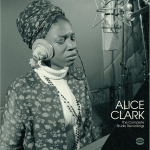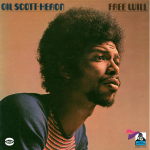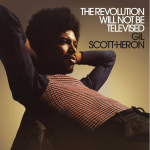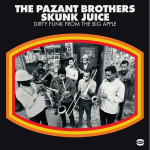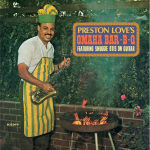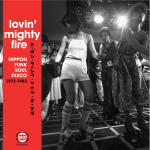Labels
BGP
- 01. Don't You Care
02. Never Did I Stop Loving You
03. Charms Of The Arms Of Love
04. Maybe This Time
05. Say You'll Never (Never Leave Me)
06. Heaven's Will (Must Be Obeyed)
07. I Keep It Hid
08. You Hit Me (Right Where It Hurt Me)
09. You Got A Deal
10. Hey Girl
11. Hard Hard Promises
12. Don't Wonder Why
13. Before Her Time
14. Looking At Life
15. It Takes Too Long To Learn To Live AloneALICE CLARK
The Complete Studio Recordings
[engl] The complete output of a great but under-recorded soul singer. Pressed on 180g white vinyl, with in-depth notes and rare photos on inner bag. Today Brooklyn is the hipster capital of the USA. Rejuvenated by gentrification, it is the place to live in the New York area if you are young and up-and-coming. Yet for a large part of the 20th century it was an adjunct to the glittering lights of Manhattan for working people and their everyday lives. Born in the late 1940s, Alice Clark came from the borough’s Bedford-Stuyvesant area and returned there when her recording career ended. Until recently the only person we could find who remembered Alice was Billy Vera. A singer, songwriter and music historian, Billy produced her first single, released on Rainy Day Records, but remembered very little despite overseeing the exceptional tracks on that 45 and a third which eventually appeared here on Ace in 2010. Alice also released the fantastic single ‘You Hit Me (Right Where It Hurt Me)’, a classic piece of uptown soul, and an album for Bob Shad’s Mainstream Records. The 45 became a northern soul anthem, whilst ‘Don’t You Care’ and ‘Never Did I Stop Loving You’ from the LP became dance floor hits on the acid jazz and modern soul scenes in the 1990s. Gathered together, the 15 tracks Alice recorded emphasise what a lost talent she was. It’s a meagre output cut over a four-year period, which yielded no success but left a large footprint. After her records failed to bring her fame and fortune, she retired from music to look after her family, most notably her seven grandchildren. Alice died in 2004, unaware how much her music meant to a couple of generations of UK clubbers. We would like to think this album serves as a fitting tribute to a great but under-recorded singer.- Format
- LP
- Release-Datum
- 25.03.2016
- EAN
- EAN 29667004619
- 01. Free Will
02. The Middle Of Your Day
03. The Get Out Of The Ghetto Blues
04. Speed Kills
05. Did You Hear What They Said?
06. The King Alfred Plan
07. The King Alfred Plan
08. No Knock
09. Wiggy
10. Ain't No New Thing
11. Billy Green Is Dead
12. Sex Education: Ghetto Style
13 ...And Then He Wrote MeditationsGIL SCOTT HERON
Free Will
[engl] Gil Scott-Heron’s second album, “Pieces Of A Man”, showed that his collaboration with musical partner Brian Jackson was very special. The record contained some of Gil’s most revered songs, including ‘The Revolution Will Not Be Televised’, ‘Home Is Where The Hatred Is’ and the title track. Although not a hit, it was a big enough success to warrant a follow-up, but when the time came Gil was unsure. With more books than albums to his name, he thought his future may have been as a writer, but Brian Jackson and producer Bob Thiele convinced him otherwise, and in March 1972 “Free Will” was recorded. The record’s first side comprised a set of songs that confirmed how well he and Brian Jackson worked together. The album’s masterpiece is ‘Did You Hear What They Said?’, one of the most effective evocations of war’s ultimate price. It was aimed at the conflict in Vietnam, but is as relevant today as when it was written. Other numbers seem to focus on the apathy or self-centred attitudes Gil saw in people’s actions. He was seeing the 60s dream turning sour and people standing idly by and letting it happen. It made for compelling art. Gil’s literary side was represented on the album’s second side, which saw him return to the spoken-word poetry found on “Small Talk At 125th And Lenox”, his first LP. The new material seemed to find him angrier and more incensed by the world. He railed against apathy in society and misuse of power by the Nixon administration. He took white musicians to task for ripping off black American music throughout the 20th century, questioning why Elvis was more successful than Chuck Berry. The only let-up occurs in the final track, ‘…And Then He Wrote Meditations’, a considered tribute to John Coltrane. “Free Will” was Gil’s final album for Flying Dutchman, and it showed a talent primed to succeed. Our reissue comes in CD and 12-inch vinyl formats. The CD version includes 11 alternate takes, taken from the original session tapes, providing a fascinating glimpse into the recording process.- Format
- LP
- Release-Datum
- 24.09.2016
- 01. The Revolution Will Not Be Televised
02. Sex Education: Ghetto Style
03. The Get Out Of The Ghetto Blues
04. No Knock (without intro)
05. Lady Day And John Coltrane
06. Pieces Of A Man
07. Home Is Where The Hatred Is
08. Brother (without intro)
09. Save The Children
10. Whitey On The Moon (without intro)
11. Did You Hear What They Said?
GIL SCOTT HERON
The Revolution Will Not Be Televised
[engl] Gil Scott-Heron never had a pop hit single; he was more important than that. With ‘Johannesburg’, ‘Home is Where The Hatred Is’ and ‘The Revolution Will Not Be Televised’ he wrote songs that resonated beyond the world of disposable chart-toppers. That’s not to say he didn’t have success, and 1974 was a very good year for him. The album “Winter In America”, released on Strata-East, spawned the radio hit ‘The Bottle’ and several cover versions. Former Columbia Records boss Clive Davis was impressed and made Gil, Brian Jackson and the Midnight Band the first signing to his Arista label later in the year. The streak continued into 1975 when their first Arista album, “Midnight Band: The First Minute Of A New Day”, made the jazz, R&B and pop charts. Gil was certainly making a name for himself. Towards the end of 1974, Gil’s former label, Flying Dutchman, put out a compilation of tracks from his first three albums. “The Revolution Will Not Be Televised” was no hastily put together cash-in. Instead it became the primer for what many would describe as Gil’s best work. From its striking Charles Stewart cover shot and lavish packaging, it was clear time and effort had been made to get the album right. From the incendiary polemicism of the title track through heart-wrenching contemplations on modern life such as ‘Pieces Of A Man’ and ‘Did You Hear What They Said?’, and back to the anger of ‘Whitey On The Moon’, it captured perfectly what his first three albums were about, revealing not just a performer but a writer every bit as poetic as Bob Dylan. The skill of his collaborators, most notably co-writer Brian Jackson and producer Bob Thiele, and musicians of the calibre of Hubert Laws, Bernard Purdie and Ron Carter, all helped to showcase his songs to their full splendour.- Format
- LP
- Release-Datum
- 24.05.2017
- EAN
- EAN 029667005814
- 01. Skunk Juice
02. A Gritty Nitty
03. Chicken Scratch
04. New Orleans
05. Fever
06. Hi Heel Sneakers
07. Why I Sing The Blues (Live)
08. Work Song
09. Juicy Lucy
10. Toe Jam
11. Fly Vines
12. We Got More Soul (Live)PAZANT BROTHERS
Skunk Juice: Dirty Funk From The Big Apple
[engl] A vinyl album containing the Pazants’ best recordings, including tracks from a live album recorded at the Museum Of Modern Art in 1970 and an excellent previously unissued version of ‘Hi Heel Sneakers’. Ed and Al Pazant have played in front of Presidents, worked with Kool and the Gang, Country Joe and the Fish and Lionel Hampton, but have never really received the credit they deserve. Multi-reed player Edward Pazant and his younger brother Alvin, a trumpeter, came from Beaufort,South Carolina. Influenced by Louis Jordan, Earl Bostic and Charlie Parker, they grew up playing their instruments wherever they could. In 1958 Ed joined Lionel Hampton’s Big Band, an arrangement that lasted on and off for 14 years. Al was also a Hampton band member for a year, before settling in New York, where he formed a small group that played Monday nights at Smalls Paradise in Harlem. Ed joined him whenever he could and they evolved into the Pazant Brothers. They built a strong reputation and appeared as the horn section on several Pucho and the Latin Soul Brothers records. In 1967 the Pazants hooked up with composer/arranger Ed Bland, who offered them the chance to become the house band at Gerald Purcell’s GWP label. Over three years they backed a number of acts and released two hard-hitting funk singles via an arrangement with RCA, plus one on GWP itself and another under the name the Chili Peppers, after the instrumental of a 45 they recorded with singer Betty Barney was picked up by DJs. They had further tracks issued on GWP promotional samplers and Bland recorded them at a special concert held at the Museum Of Modern Art in Manhattan in 1970. The two tracks from that that LP contained here feature vocals by Betty Barney. After GWP closed they continued recording for Vigor, Vanguard and other labels, as well as featuring on numerous sessions. The work on this LP is the high point of their recording career.- Format
- LP
- Release-Datum
- 24.05.2017
- 01. Chicken Gumbo
02. Chili Mac
03. Cream Dream
04. Neck Bones
05. Cool Ade
06. Omaha Bar-B-Que
07. Hoe Cakes And Sorghum
08. Shuggie's Chittlin' Blues (Shuggie's Boogie)
09. Pot LikkerPRESTON LOVE
Omaha Bar-B-Q
[engl] his album is one of a surprisingly large number of deeply funky releases that appeared in the late 60s and throughout the 70s by older players - usually associated with either blues or rock'n'roll. On the Modern group of labels alone there were albums by Joe Houston, Johnny Otis and an unreleased gem by Pee Wee Crayton. For years these albums have been treated with disdain by those who collect the artists as commercial sell-outs and were so obscure that they were unknown to funk fans. This has started to change as funk collectors dig deeper - and they have been schooled by years of digging out oddities with an open mind. No frontiers. An original copy of Omaha Bar-B-Q now sells for over £60 in this country. Preston Love was not a straight R&B player-.-having been born in 1921 he came up playing his alto saxophone in the big bands during the latter part of the swing era. In his local area he played in bands led by Lloyd Hunter and Nat Towles and in September 1943 he replaced Earl Warren for six weeks in the Count Basie Band. He then rejoined Hunter and then began working with both Lucky Millinder and Harlan Leonard, before becoming a full time member of the Basie band between 1945-47. The swing era was well and truly over by that stage and so, after leaving Count Basie, he formed his own R&B band and made several recordings for various labels, including Federal. He carried on working in the R&B field and hooked up with Johnny Otis in the early 60s. They worked together regularly for the next two decades, and from the early 70s onwards switched between contemporary black music and the rock'n'roll revival. This album was recorded in 1969 by Johnny's regular band, which by this time included the blistering guitar playing of his 14 year old son, Shuggie. Shuggie's playing had first been heard on the album Cold Shot, notably on the single Signifying Monkey. Shuggie was only months away from the start of a solo recording career with Epic, which culminated in some beautiful Sly Stone-influenced music such as Inspiration Information and the original version of Strawberry Letter 23 that was a big international hit for the Brothers Johnson on A&M. This album and the rare single, first released on the tiny LA-based Hudson label, Cissy Popcorn, (not heard here) are proof positive that Love's blues-drenched soul alto is the perfect vehicle for a funk record. Pot Likker and Chili Mac are liable to keep you dancing with their tight funky grooves. The personnel on this LP comprise pretty much the band (augmented by horns) that played the 1970 Monterey Pop Festival. What a sight that must have been!- Format
- LP
- Release-Datum
- 24.09.2016
- 01. By By Session Band - Lily
02. Sentimental Hotel - Rie Nakahara
03. Bara To Yajuu - Haruomi Hosono
04. Why Don't You Move In With Me - Yasuko Agawa
05. Jiken Ga Okitara Bell Ga Naru - Pink Lady
06. Summer Champion - Yuko Asano
07. Dancin' - Junko Ohashi
08. Rainbow Paradise - Masayoshi Takanaka
09. Uragiri - Mari Natsuki
10. Maboroshi No Hito - Miyako Chaki
11. Banana - Kay Ishiguro
12. Funky Miyo-chan - Masaaki Hirao
13. Yashow Macashow - Ebonee Webb
14. Lovin' Mighty Fire - Naoya Matsuoka & Minako Yoshida
V/A
Lovin' Mighty Fire - Nippon Funk * Soul * Disco 1973-1983
[engl] The first official collection of Japanese soul, funk and disco in the West. Talk of Japanese soul often refers to enka, the sentimental ballad emanating from downhome bars and karaoke boxes. From the late 1960s, however, reverberations from across the Pacific would lead to the nation’s own take on soul music as we know it in the West. Some of the artists showcased on this compilation may not have been commercially successful but their legacy stands the test of time. Lily’s uptempo funk-rock gem ‘By By Session Band’ features a pre-Yellow Magic Orchestra Ryuichi Sakamoto on keyboards. Also from YMO, Haruomi Hosono’s ‘Bara To Yajuu’ (Rose And Beast) rocks to a hypnotic high hat, charting a course between slow disco and cumbia. Two western covers here: Yasuko Agawa’s version of Gene McDaniels’ ‘Why Don’t You Move In With Me’ and Yuko Asano’s ‘Summer Champion’ – a reworking of Sergio Mendes’ ‘Summer Dream’. Memphis funk band Ebonee Webb reversed the role and stormed the Japanese charts with ‘Disco Otomisan’. They followed with the album “Memphis Soul Meets Japanese Folk Songs”, from which ‘Yashow Macashow’ comes. Razzamatazz is provided by vocal duo Pink Lady, one of the country’s most successful teen pop/disco acts and the first Japanese artists to chart in the US since Kyu Sakamoto’s ‘Sukiyaki’ way back in 1963. Junko Ohashi’s ‘Dancin’, recorded in New York, was produced by keyboard player Ken Sato (her husband) and jazz bassist Teruo Nakamura. Naoya Matsuoka’s ‘Lovin’ Mighty Fire’‚ graced by soul diva Minako Yoshida, was released in 1979 as a blue vinyl 12-inch single, just before Matsuoka got his big break with the fusion boom. Masaaki Hirao was one of a small group of artists who led the Japanese rockabilly boom in the late 1950s (as highlighted on our “Nippon Rock’n’Roll” collection). He became a force in the music industry, as a writer and producer, and is a major player to this day. He released ‘Funky! “Miyo” Chan’ under the alias Sexy Rhythm Sections. An update of one of his early songs, it was arranged by jazz keyboardist Jun Fukamachi. There is a semi-mythical creature in the West: the Japanese record dealer, who, turning up unannounced in a record shop in America or Europe makes an offer on the whole stock. The hunger of Japanese collectors for soul, funk and disco is world-renowned, with many rarities ending up there. But there was a groove obscured from the West, until now. Coiled, like a sleeping dragon, it was there all this time, in the land of Japan.- Format
- DoLP
- Release-Datum
- 24.02.2017

